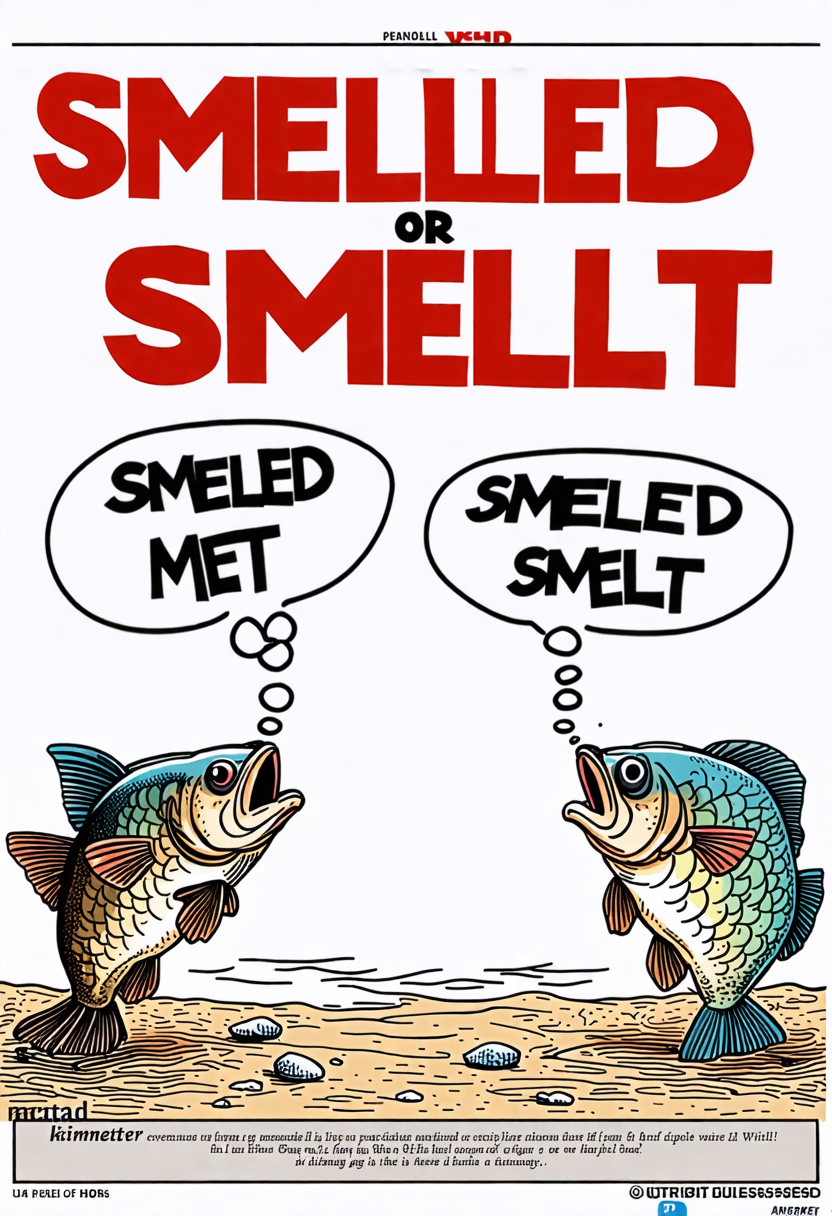Smelled or Smelt?
“Smelled” and “smelt” are both past tense forms of the verb “smell.” “Smelled” is commonly used in North American English, whereas “smelt” is more often used in British English. In British English, both variations are acceptable and can be used interchangeably.
Defining Smelled and Smelt
The words ‘smelled’ and ‘smelt’ serve as the past tense forms of the verb ‘smell,’ but their usage varies by region. In North American English, ‘smelled’ is commonly used. In British English, both ‘smelled’ and ‘smelt’ are acceptable. However, ‘smelt’ is less frequently used in North America.
Additionally, ‘smelt’ has meanings unrelated to scent. It refers to a small fish and the process of extracting metal from ore. The verb ‘smell’ belongs to a group of verbs that have dual past tense spellings. This duality reflects historical and regional language development.
Smelled in English Usage
Understanding the regional variations of ‘smelled’ and ‘smelt’ enhances clarity in communication. In North American English, ‘smelled’ is primarily used as the past tense of ‘smell.’ This choice aligns with American spelling conventions and is rarely substituted with ‘smelt.’
In British English, however, both ‘smelled’ and ‘smelt’ are used interchangeably.
Using ‘smelled’ in sentences can evoke vivid imagery and emotions:
- Nostalgia: ‘The old book smelled like childhood memories.’
- Curiosity: ‘The mysterious perfume smelled intriguing.’
- Comfort: ‘The freshly baked bread smelled like home.’
Smelt in British English
In British English, ‘smelt’ serves as an alternative past tense form of ‘smell.’ This usage is common and accepted, allowing for interchangeable use of ‘smelled’ and ‘smelt.’
While both forms are grammatically correct in British English, ‘smelt’ is less frequently used in North American English, where ‘smelled’ is preferred. The choice between ‘smelled’ and ‘smelt’ in British English often depends on personal preference or regional dialects.
This flexibility in past tense forms extends to other verbs as well, reflecting the diverse nature of the English language. Understanding this difference is important for effective communication, particularly in writing and formal contexts.

Smelt as a Fish
Moving from linguistic nuances, smelt also refers to a type of fish known for its distinct characteristics and habitats. These small, silvery fish are often found in both freshwater and saltwater environments. One of the most notable species is the delta smelt, an endangered fish native to California’s Sacramento-San Joaquin Delta.
Consider these facts to understand the importance of smelt:
- Biodiversity: The delta smelt’s survival is essential for maintaining the ecological balance in its habitat.
- Conservation: Efforts to save the delta smelt highlight the broader environmental challenges we face.
- Culinary Delight: Smelt are also prized in culinary circles for their delicate flavor and texture.
Metalworking and Smelting
Metalworking involves the process of smelting, where raw ores are heated to extract usable metals. This ancient technique is essential in producing various metals like iron, copper, and aluminum.
Smelting requires high temperatures to melt the ore, separating the metal from impurities. The refined metal can then be cast into shapes or further processed for industrial use. Modern smelting uses advanced technology to improve efficiency and reduce environmental impact.
This process is important in manufacturing, construction, and other industries. Understanding smelting is essential for anyone involved in metal production and usage. It highlights the importance of transforming raw materials into valuable resources, sustaining many facets of modern life.
Examples of Smelled
A red sage smelled distinctly like pineapple, showcasing the unique way scents can evoke specific memories and associations. The simple act of smelling can trigger powerful emotional responses.
Consider these examples:
- Childhood Memories: The scent of freshly baked cookies can transport someone back to their grandmother’s kitchen.
- Emotional Connections: A whiff of perfume might remind someone of a loved one, sparking feelings of love and nostalgia.
- Environmental Awareness: The smell of rain on dry soil can evoke a sense of calm and connection to nature.
Examples of Smelt
In British English, ‘smelt’ frequently appears as the past tense of ‘smell,’ though it also has distinct meanings in different contexts. For instance, the delta smelt is a crucial fish species in California’s ecosystem, currently endangered.
In another context, ‘smelt’ refers to the process of extracting metals from ores. For example, companies smelt jewelry into bullion for resale. Smelting plays an essential role in various industries, such as manufacturing and construction. The term ‘smelted’ describes materials that have undergone specific refinement processes.
Regional Preferences
Understanding the versatility of ‘smelt’ leads us to examine its regional preferences. In British English, both ‘smelled’ and ‘smelt’ are used interchangeably, reflecting a flexible approach to past tense verb forms.
Conversely, in North America, ‘smelt’ is rarely used, with ‘smelled’ being the dominant choice. This divergence stems from regional spelling conventions and linguistic evolution.
To evoke emotion about the impact of these preferences, consider:
- Connection: Language nuances can foster a sense of belonging.
- Identity: Regional word choices can reflect cultural identity.
- Adaptation: Adapting to local language customs can enhance communication.
Language Variations
Language variations reveal how cultural and regional differences shape communication. These differences are evident in the usage of words like ‘smelled’ and ‘smelt.’ In British English, both forms are acceptable and used interchangeably. However, in North American English, ‘smelled’ is primarily preferred, with ‘smelt’ rarely used except in specific contexts like metalworking or fishing.
These variations are not just about spelling but reflect deeper cultural and linguistic trends. Understanding these nuances can enhance comprehension and avoid confusion.
Language is dynamic and evolves based on regional influences. Recognizing and respecting these differences is essential for effective communication, whether in literature, conversation, or professional settings.







